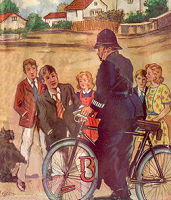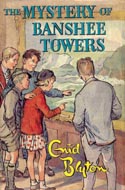
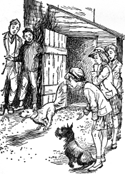
Ern's new dog Bingo is released from Old Clear Orf's coal shed.
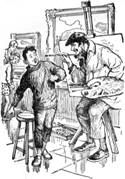
At the Banshee Towers museum of paintings, an angry artist paints a mustache on poor Ern's face!
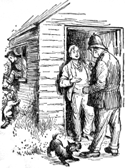
Mr Goon is on Ern's warpath—but Fatty distracts him while Ern slips out the window.
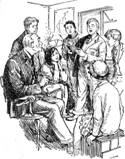
Fatty explains to Superintendent Jenks everything that's going on at Banshee Towers.
The Mystery of Banshee Towers
Review by Keith Robinson (February 23, 2005)
Enid Blyton should have quit at Mystery #14, The Mystery of the Strange Messages. There's something about The Mystery of Banshee Towers that makes me shake my head in dismay. Previously I had Spiteful Letters pegged as the weakest story, at least in terms of plot and realism, but now it seems like a work of art compared to Banshee Towers. The plot in this story is silly to say the least, and riddled with holes. There are also odd gaffs in the continuity of the series that make me think this book was written by someone who should have retired from writing a year or two before.
The mystery itself concerns an old building on top of a hill, an art gallery where a banshee wails every Thursday and drives out what few punters they have. The banshee, Fatty assures everyone from the start, is a fake—a clever device set up to make it seem like the place is still haunted, as it used to be a hundred years ago. So it's sort of like Scooby Doo, where the gang figures out the ghost is actually a mechanical contraption, and the baddies would have got away with it, too, if it wasn't for those pesky kids. In this case, the baddies are smuggling valuable paintings out of the building and selling them in America. Apparently all the paintings are lent by a rich guy in Austria—and while on display at the Banshee Towers gallery, a French artist sits there and copies them. The owner of the gallery, Mr Engler, is in cahoots with the artist as well as the turnstile man, and together the three of them have a racket going. The paintings are smuggled out in lead pipes, which are stacked up outside as if work is being done to the plumbing.
There's a feeling of emptiness at Banshee Towers. I believe something was mentioned about the place being pretty much empty a lot of the time, but really, the places seems almost completely devoid of people except where mentioned specifically. I don't know if it was intentional, but Enid Blyton has conjured up a building that has NO visitors except Fatty and his friends, plus a few other people that are there on the first day (but not during subsequent visits). If the place is so empty, why all the subterfuge—smuggling paintings out in lead pipes, driving people home early on Thursdays with the help of the banshee...in fact, why have the place open more than a couple of days a week at all?
There's mention towards the end that the police have been "keeping an eye on the crooks" because they suspect paintings are being smuggled out and sold abroad. When Fatty and Ern were tightly bound and locked in a room, Fatty managed to glance out the window and note the licence plates of both a blue van and a car as the baddies drove away...and yet the undercover cop that had supposedly been watching the goings-on at the gallery for an undefined amount of time—from some unmentioned location—"was not quick enough to take the numbers." Shame on him!
When Mr Engler finds Fatty and Ern sneaking about in the building, he orders the turnstile man to tie them up—tightly—and tells the boys they can stay there without food and water until he returns in a few days—as punishment for snooping, he says. Er...so he's going to tie up their hands and feet (tightly!) AND leave them in a locked room with no food or water...? For three days or more? Whether this was actually his intention or not is never fully explained, but it seems so at the time—because the bad guys tie them up and drive off. But then Mr Engler phones the police and reports the kids as intruders, so I'm not sure what to make of it all.
Some other minor quibbles that add to the mess: Jenks is mentioned first by Bets when she says, "What about telling the Chief Inspector? You know, Inspector Jenks..." After that it's a mixture of Chief Inspector and simply Inspector. Which is it, exactly? Well, as we know, it's neither—because he's supposed to be a Superintendent now. The continuity is screwed up. As a recap, he was Superintendent throughout Holly Lane and Tally-Ho Cottage, back down to Chief Inspector for Missing Man, then back up to Superintendent for Strange Messages...and now, in Banshee Towers, I think everyone's so muddled that even Jenks himself doesn't know anymore.
Another head-scratching slip is when Ern announces that "one of his sisters has measles." Sisters? We know all about Sid and Perce, but there's been no mention of any sisters at all. And suddenly Mr Goon inexplicably doesn't have a housekeeper anymore and his house no longer counts as the local village police station; now we're to believe he "goes off to the police station" every day.
Enid Blyton often adds personal comments (or narrator's voice) at the end of each book, such as "And there we leave the Find-Outers to enjoy their tea. Let's hope they have many more mysteries to solve in the future!" But there are several such comments in this book, annoyingly tacked on to the end of various chapters, like "And there they go, one by one. Be careful, Fatty—there may be danger ahead!" It's almost like she's forgotten which age group this is intended for.
There's also a lot of talk about Buster and Bingo's antics, especially in the shed, which got very boring for me after a while. Oh, and another silly quibble while I think of it: Fatty asks his mother for a camp bed but won't tell her why; he sets it up for Ern in the shed. The next morning, Mrs Trotteville happens to pop her head in and is surprised to see Ern there "bright and early"...and she doesn't even notice the camp bed!
Is there anything good to mention about this book? Er...not really. It's easy to make concessions for tiny slips-ups and questionable plot elements when the rest of the book is enjoyable, but Banshee Towers has far too many annoyances for me to see past. A very sad end to the series, I think. I'll finish with something Ern said to Fatty, which was "You're a friend, you are—and I can't say more than that, can I?"
To which Fatty replies, "...I bet I'll say the same about you someday, Ern!" Is Ern not presently a friend then?


